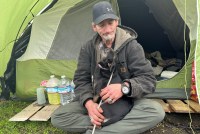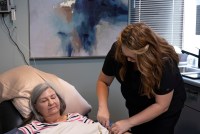Latest KFF Health News Stories
California May Face More Than $40M in Fines for Lapses in Prison Suicide Prevention
A court expert reported that California prisons continue to lag on 14 of 15 suicide prevention measures, and even regressed in some areas. The state could face more than $40 million in fines after a federal judge warned more than a year ago that she would impose penalties for each violation.
Why Even Public Health Experts Have Limited Insight Into Stopping Gun Violence in America
After the 1996 Dickey Amendment halted federal spending on research into firearms risks, a small group of academics pressed on, with little money or political support, to document the nation’s growing gun violence problem and start to understand what can be done to curb the public health crisis.
Statistical Models vs. Front-Line Workers: Who Knows Best How to Spend Opioid Settlement Cash?
A mathematical model designed to direct spending of opioid settlement funds is at the center of a debate over whether to invest in technology to guide long-term decisions or focus on the immediate needs of people in addiction.
Journalists Examine Medicaid Unwinding, Farmworkers’ Mental Health, and the Big Opioid Payback
KFF Health News and California Healthline staff made the rounds on national and local media this week to discuss their stories. Here’s a collection of their appearances.
California Hospitals, Advocates Seek Stable Funding to Retain Behavioral Health Navigators
California has supported expanded use of medications in the fight against opioid use disorder and overdose deaths. But hospitals and addiction treatment advocates say the state needs to secure ongoing funding if it wants more behavioral health workers to guide patients into long-term treatment.
Readers Call on Congress to Bolster Medicare and Fix Loopholes in Health Policy
KFF Health News gives readers a chance to comment on a recent batch of stories.
California Gov. Newsom Wants Voters to Approve Billions More to Help the Homeless. Will It Help?
A March 5 ballot initiative seeks $6.4 billion to build thousands of new housing units and provide mental health treatment for homeless people — on top of the billions already being spent to address the public health crisis. Despite significant support from health and law enforcement officials, many front-line workers are skeptical that more money is the answer.
Health Care Workers Push for Their Own Confidential Mental Health Treatment
Montana may join about a dozen other states in creating “safe havens” that keep health care professionals from facing scrutiny from licensure boards for seeking mental health or addiction treatment.
Cities Know That the Way Police Respond to Mental Crisis Calls Must Change. But How?
Cities are experimenting with new ways to meet the rapidly increasing demand for behavioral health crisis intervention, at a time when incidents of police shooting and killing people in mental health crisis have become painfully familiar.
Colorado Legal Settlement Would Up Care and Housing Standards for Trans Women Inmates
A soon-to-be-finalized legal settlement would offer transgender women in Colorado prisons new housing options, including a pipeline to the Denver Women’s Correctional Facility. The change comes amid a growing number of lawsuits across the country aimed at improving health care access and safety for incarcerated trans people.
Acuerdo legal en Colorado mejoraría estándares de atención y vivienda para reclusas trans
El Departamento de Justicia de Estados Unidos encontró en 2014 que las personas trans en prisión tienen muchas más probabilidades de experimentar violencia sexual tras las rejas tanto del personal como de otros presos.
Ketamine Therapy for Mental Health a ‘Wild West’ for Doctors and Patients
Ketamine, approved by the FDA as an anesthetic in 1970, is emerging as a major alternative mental health treatment, and there are now more than 500 ketamine clinics around the country. But with little regulation and widely varying treatment protocols, it’s a medical “wild West.”
Native American Communities Have the Highest Suicide Rates, Yet Interventions Are Scarce
Native Americans die by suicide at a higher rate than any other racial or ethnic group, yet research into effective and culturally appropriate interventions is uncommon.
Una decisión difícil: cuando los adultos mayores tienen que dejar de conducir
Los riesgos para los conductores mayores aumentan con la edad y el desarrollo de afecciones como la artritis, el glaucoma y el Parkinson. Y cuando ocurren accidentes, son más propensos a sufrir heridas graves o morir porque son físicamente más vulnerables.
Estados utilizan dinero de Medicaid para combatir la violencia con armas de fuego
Una inyección de financiamiento federal confiable podría permitir que organizaciones sin fines de lucro amplíen su alcance para llegar a más residentes con mayor riesgo de ser víctimas de disparos, o de disparar a alguien.
Preparing to Hang Up the Car Keys as We Age
As cognitive skills erode with age, driving skills weaken, but an aging driver may not recognize that. Advance directives on driving are one way to handle this challenge.
In Los Angeles, Occupational Therapists Tapped to Help Homeless Stay Housed
Los Angeles County is deploying a small team of occupational therapists to help newly housed individuals adjust to life indoors. Therapists are trained to recognize disabilities and help with basic living skills, such as hygiene and cleanliness, that can help prevent clients from getting evicted or slipping back onto the streets.
988-Hotline Counselors Air Concerns: More Training Needed to Juggle a Mix of Calls
Dozens of crisis counselors responded to a survey about their work experiences, painting a picture of uneven training, uncertainty about how long to stay on the line, and different policies on whether to inform a caller when police are on their way.
Rising Suicide Rate Among Hispanics Worries Community Leaders
The suicide rate for Hispanics in the United States has increased significantly over the past decade. The reasons are varied, say community leaders and mental health experts, citing factors such as language barriers, poverty, and a lack of bilingual mental health professionals.
Líderes comunitarios alarmados por el aumento de la tasa de suicidios en hispanos
Incluso niños hispanos en edad escolar han intentado hacerse daño o han expresado pensamientos suicidas, indican investigaciones.























